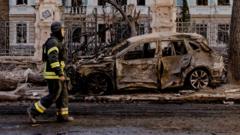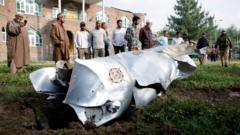Former President Donald Trump has once again pointed the finger at Ukrainian President Volodymyr Zelensky, blaming him for igniting the war with Russia shortly after a destructive missile assault killed numerous civilians in Sumy. As tensions rise, Trump's remarks coincide with growing frustration regarding the ongoing violence in the region, with leaders from NATO visiting Ukraine in a show of solidarity.
Trump Holds Zelensky Accountable for War Amid Escalating Violence in Ukraine

Trump Holds Zelensky Accountable for War Amid Escalating Violence in Ukraine
In the wake of a devastating Russian strike in Sumy that claimed 35 lives, Trump attributes blame to Ukrainian President Zelensky for the ongoing conflict.
Trump's continued accusations against Zelensky come amid claims of shared responsibility, redirecting some blame towards President Biden as well. Despite the historical context of the conflict, Trump's statements have reignited discussions surrounding U.S. foreign policy towards Russia and Ukraine.
On Sunday, a deadly Russian attack on the city of Sumy left 35 people dead and more than 100 injured, leading to increased scrutiny of all parties involved in the ongoing conflict. Following the attack, Trump reiterated his claim that both Zelensky and Biden shared responsibility for the war's casualties, which he exaggerated to "millions," contrasting starkly with actual figures.
"Russia is the aggressor, Russia started this war, there's no doubt," said NATO Secretary General Mark Rutte, who visited Ukraine to express solidarity with the victims of the recent attacks. Rutte condemned Russia's reckless pattern of targeting civilians as Moscow continues to pry into Ukrainian territory nearly a decade since the initial conflict erupted in 2014.
Trump positioned his comments amid Russia's assertion that the strike targeted a Ukrainian military meeting, a justification dismissed by Ukrainian media reporting the intended victim's identity as civilian veterans. Moreover, discontent has culminated in the dismissal of Sumy's regional chief by Zelensky due to the controversial event's hosting.
Amidst Trump’s commentary, he also criticized Biden's handling of the war and suggested that either leadership could have altered its trajectory. "Everybody is to blame," Trump asserted, noting that one must consider the tactical ramifications when challenging a military far more powerful.
Ironically, while criticizing current U.S. foreign policy, Trump actively pursued negotiations with Moscow during his presidency, claiming to have established a positive rapport with Putin.
Furthermore, Trump's envoy discussed peace prospects that included Russia's territorial claims and rejected NATO's protective clauses, setting the stage for potential diplomatic discussions, yet no clear directives were on the table.
In a plea directed towards Trump before any deliberations occur, Zelensky emphasized the urgency of witnessing the deteriorating situation for himself. He urged leaders to consider the human impact of the conflict before negotiating. The circumstances surrounding the latest attack exemplify the grim reality facing millions in Ukraine, as discussions regarding peace and responsibility continue to diverge.
As the conflict continues to unfold with no immediate end in sight, the stakes are rising for those involved, both in leadership and among civilians enduring the consequences of war.
On Sunday, a deadly Russian attack on the city of Sumy left 35 people dead and more than 100 injured, leading to increased scrutiny of all parties involved in the ongoing conflict. Following the attack, Trump reiterated his claim that both Zelensky and Biden shared responsibility for the war's casualties, which he exaggerated to "millions," contrasting starkly with actual figures.
"Russia is the aggressor, Russia started this war, there's no doubt," said NATO Secretary General Mark Rutte, who visited Ukraine to express solidarity with the victims of the recent attacks. Rutte condemned Russia's reckless pattern of targeting civilians as Moscow continues to pry into Ukrainian territory nearly a decade since the initial conflict erupted in 2014.
Trump positioned his comments amid Russia's assertion that the strike targeted a Ukrainian military meeting, a justification dismissed by Ukrainian media reporting the intended victim's identity as civilian veterans. Moreover, discontent has culminated in the dismissal of Sumy's regional chief by Zelensky due to the controversial event's hosting.
Amidst Trump’s commentary, he also criticized Biden's handling of the war and suggested that either leadership could have altered its trajectory. "Everybody is to blame," Trump asserted, noting that one must consider the tactical ramifications when challenging a military far more powerful.
Ironically, while criticizing current U.S. foreign policy, Trump actively pursued negotiations with Moscow during his presidency, claiming to have established a positive rapport with Putin.
Furthermore, Trump's envoy discussed peace prospects that included Russia's territorial claims and rejected NATO's protective clauses, setting the stage for potential diplomatic discussions, yet no clear directives were on the table.
In a plea directed towards Trump before any deliberations occur, Zelensky emphasized the urgency of witnessing the deteriorating situation for himself. He urged leaders to consider the human impact of the conflict before negotiating. The circumstances surrounding the latest attack exemplify the grim reality facing millions in Ukraine, as discussions regarding peace and responsibility continue to diverge.
As the conflict continues to unfold with no immediate end in sight, the stakes are rising for those involved, both in leadership and among civilians enduring the consequences of war.





















